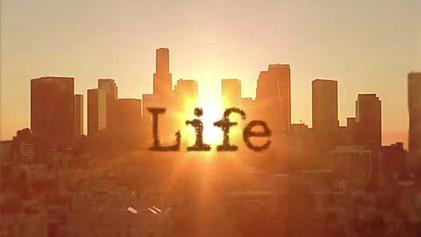Here are the highlights:
Into the wilderness
Driving in the desert, Detectives Crews and Reese pass a brown sign pocked with bullet holes. It says:
You Are Now Entering Sovereign Tribal Land
The show never gives the tribe a name or a specific location. It's merely somewhere in the Southern California desert. This approach actually works well. If the creators had given the tribe a phony name, it might have led to unfortunate questions or mistakes. Same with a specific location. This way, we get the idea without a lot of distracting details.
Reese offers the usual white man's complaint about the desert: "There's no here here." Crews responds with his usual Zen-like response: "All there is is here here." Too bad he didn't offer some Native-style wisdom--e.g., "To the Native inhabitants, everything was here. The land gave them food, shelter...whatever they needed." Coming from a semi-New Ager like him, this would've been appropriate.
Opposing forces
Because of an upcoming casino, the tribe has formed its own police force. It's taken over the policing from the county sheriff's department. This is totally realistic.
Officer Hawes, the murder victim, was found on the rez. But he was a sheriff's deputy who lived off the rez in a trailer. Therefore, there's a jurisdictional question between the tribe and the sheriff's department.
Also, as the show notes, sheriffs can enter the rez only in "hot pursuit" of a criminal suspect. But Hawes often seemed to find a reason for a "hot pursuit." So there's bad blood between the two police departments—again, totally realistic.
This bad blood is the reason Crews and Reese have been called in from the LAPD—to handle the investigation as a neutral party. This seems reasonable—but the participants wouldn't have called the LAPD, which is 2-3 hours away. They would've called the police force in Palm Springs, Riverside, or the nearest big city.
Casino coming
Near the crime site, a billboard says the following:
Eagle Arrow Casino & Spa
Another Vadas Bros. Experience
The "Vadas Bros." line isn't necessary, of course. It's an instant clue that corrupt casino investors will be involved in the plot. Sigh.
The three tribal officers are led by a woman, Captain Whitehat. Having an Indian woman in charge is yet another nice touch. She has a strong, sharp personality, but isn't overly hostile. In other words, she doesn't have a stereotypical "white people are bad" attitude. She's just a professional doing her job.
I'm tempted to give the show credit for not naming her Captain Brave Eagle or something similar. "Whitehat" is clearly an atypical name. But I'm afraid it's a pun on "white hat," meaning she's one of the good guys who wears a white hat. No points for using a "funny" Indian name as a symbolic message.
Looking good
What we see of this unnamed desert reservation is again reasonable. It's mostly empty roads and land, a few trailers, and pickup trucks. This view is superficial, of course; we don't go deeper into the rez than the interior of a trailer. But that's understandable in a show about white cops from Los Angeles.
All in all, this is a fine 15 minutes of Native-themed TV. If every 15 minutes of Native-themed TV were this good, I wouldn't have much to complain about.


No comments:
Post a Comment